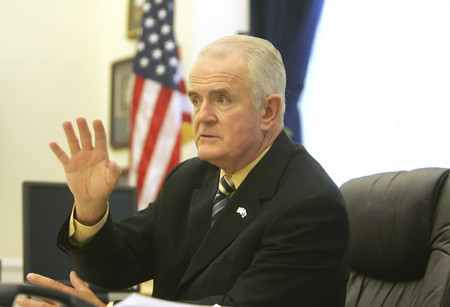Legislators say state budget can’t be cut further


CARSON CITY — Legislative leaders emerged from a closed-door meeting with Gov. Jim Gibbons on Wednesday to insist that nothing more can be cut from the state budget, though a shortfall of $2.4 billion could prompt them to increase taxes when the Legislature next goes into session in 2011.
"What would you cut?" asked Senate Majority Leader Steven Horsford, D-Las Vegas. "Fifty-five percent of the budget is for education, 20 percent for health and human services. We cut all we could cut in the last session."
Senate Minority Leader Bill Raggio, R-Reno, said he doesn’t support cutting programs for which the state receives revenue.
"There isn’t a lot to cut," Raggio said.
Horsford said legislators need to develop a plan to provide adequate revenue for the state to avoid massive spending shortfalls. He leads a special committee looking at the state’s revenue structure. It next meets on Monday.
The committee has been advertising for a private research firm to analyze state taxes and make recommendations, which probably will include tax increases, for the 2011 Legislature. Past state tax studies largely have been ignored.
The new shortfall estimates could mean the 2011 Legislature will be as rancorous as the one that ended in June should a Republican continue to hold the governor’s seat.
Already, new Republican gubernatorial candidate Brian Sandoval is setting himself up for a fight by insisting he won’t increase taxes, just as Gibbons did earlier this year in vetoing legislation that hiked taxes.
His vetoes were overidden by the Democrat-dominated Legislature with the help of Raggio and a few Senate Republicans.
Estimates released Wednesday showed that state unemployment, now at record levels, will increase more and force Nevada to borrow $1 billion in the coming year from the federal government to keep paying benefits to laid-off workers.
Though Raggio will not commit to supporting higher taxes, he will not sign an anti-tax pledge; he advised other legislators and gubernatorial candidates to do the same.
He warned that legislators could face lawsuits if they cut public school spending. They have a legal requirement to fund education adequately, he added.
Gibbons left the meeting through a side entrance and avoided questions from the media. Daniel Burns, his communications director, said the governor had another meeting to attend.
According to handouts given legislators by state budget officials, Nevada’s unemployment rate will peak at 13.7 percent in August before starting to decline. Nevada now has a record 12.5 percent unemployment rate.
Gibbons already has applied for a $264 million federal loan to cover unemployment costs for the remainder of the calendar year.
The state’s unemployment trust fund will run out of money in October.
But Raggio said the governor might need to request another $800 million to cover unemployment costs in 2010.
He added that more than 20 states also are seeking no-interest federal loans to cover unemployment benefits.
Nevada last sought a federal loan to cover unemployment benefits in 1974. Federal loans must be paid back through an extra charge on the unemployment taxes paid by employers.
Employers now pay an average 1.33 percent tax rate on the first $26,600 of each employees’ wages; the tax was as high as 3.22 percent in 1976.
Assembly Speaker Barbara Buckley, D-Las Vegas, said the "trends are alarming" but advised the state to wait until the recession is over before possibly increasing the tax rate.
The Employment Security Division’s council meets Oct. 6 and then will make recommendations on the tax rate.
The $2.4 billion revenue hole in 2011 might occur because $780 million of the $1 billion in tax increases approved in June expire unless reapproved.
Also, $400 million in federal stimulus funds used this year to plug holes in the budget will not be available.
And budget analysts contend that at least $1 billion in additional spending will be needed to keep up with the expected enrollment growth in Medicaid and other programs.
Through the first two months of the current fiscal year, state tax revenue was $8 million short of the amount needed to cover the current $6.9 billion, two-year general fund budget.
The governor will hold another meeting with legislative leaders in November.
Contact Capital Bureau Chief Ed Vogel at evogel@reviewjournal.com or 775-687-3901.












